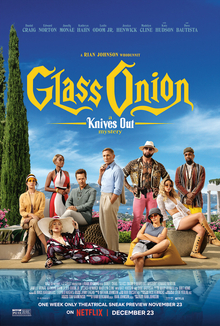
I like mysteries, once in a while, but I don’t trust them. They are too often contrived, “too clever by half” as the saying goes. Their narratives double back and re-interpret, like lawyers who revisit a set of testimony and add what was elided, in order to “explain” things to favor their clients.
So yesterday, Christmas Day, after an early Christmas brunch/dinner at the Claremont Hotel up the road from us in Berkeley, we streamed the new film Glass Onion. It’s a sorta sequel to the 2019 film Knives Out in that it involves the detective Benoit Blanc, played by Daniel Craig. That earlier film was a country estate murder mystery; this one is more like stories like And Then There Were None, in that it’s set on a tropical island where numerous characters are invited for a long weekend.
I enjoyed the film a lot. (I loved those puzzle boxes, which should earn some production designer an award.) Since it just came out on streaming, many of my Facebook friends watched it too, this past weekend, and commented on it. David Gerrold apparently watched 20 minutes at a time and then paused to post on Facebook about his speculations and observations. A few of my Fb friends found the that the end ruined the film, as if the writer/director had run out of ideas and simply blew everything up.
A common observation was that the billionaire villain, Miles Bron, was obviously based on Elon Musk, with his elaborate technological schemes and base cluelessness. Of course the film production began two years ago, just as the pandemic was setting in (thus the initial scene with Daniel Craig zooming in the bathtub), but long before the current Elon Musk idiocies.
To return to my basic point. This mystery does what many do. The story reaches a kind of solution, one that satisfies everyone on this island — the victim of a poisoned drink excluded of course — but then the master detective steps in, and revisits the sequence of events, adds observations none of them saw earlier (the film’s editing is masterful, as it interpolates snippets of previous scenes to illustrate his points), and gradually draws to a new conclusion, that implicates… someone else. It’s manipulative and clever, in a way I suspect mystery writers go out of their way to do for its own sake. I understand that that’s the point of a mystery, especially when the reinterpretation uses events we’ve already seen and just not noticed, as this one does quite well.
But where does it end? I recall Isaac Asimov explaining that one of his robot novels what written in three parts, with new ‘explanations’ at the end of each part, so that if couldn’t sell the entire novel, then maybe he could at least sell the first third as a novella. So was there a there there? Or are mystery stories misdirection and reinterpretation for their own sake?
Significantly different, I think, is how science works. Science continually reaches provisional conclusions based on evidence seen, and is perfectly happy to incorporate new evidence, or even reinterpret old evidence, to reach a a different provisional conclusion. But you can be pretty sure there’s a core, unchanging reality to be found. Mystery directors and writers are more like magicians. You think you’ve seen what they have to reveal until, hey presto, in turns into something else!
Mystery writers have a particular conclusion in mind. Well, sometimes. And their stories play with the audience with provisional conclusions they know are false, to keep the story going as long as they can.
Again: people live by stories. The stories are more important, to many, than the conclusions.





